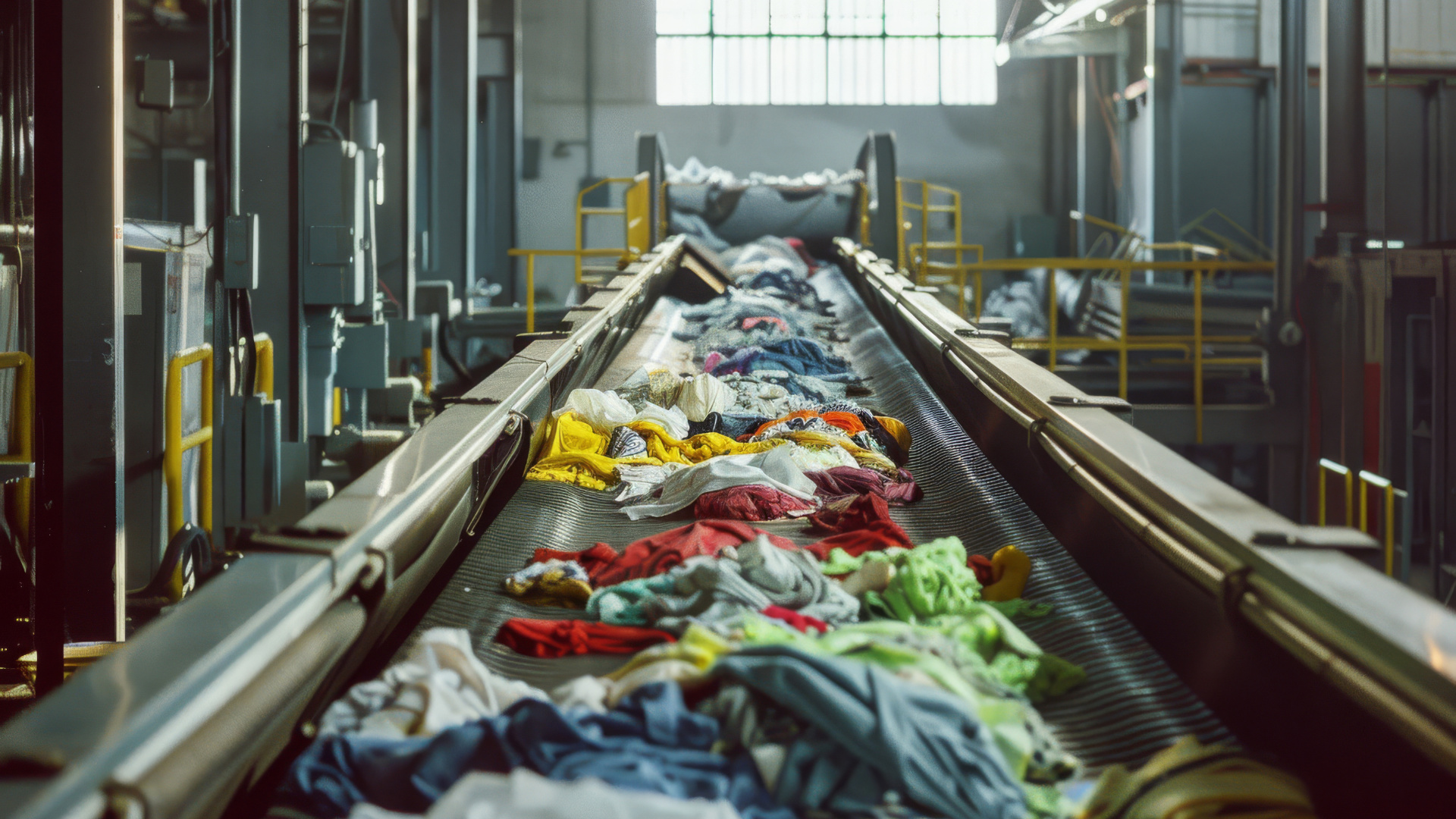
Key Takeaways:
- California legislators have approved the Responsible Textile Recovery Act of 2024, which could make California the first US state to establish an extended producer responsibility (EPR) program for apparel and textiles. While a step forward, the bill’s implementation still requires collaboration between brands, recyclers, and regulators.
- The US Department of Justice (DOJ) has intensified its antitrust investigation into chipmaker Nvidia, intended to lead to more competition in the AI chip market and consequently better pricing, innovation, and product quality.
- Swedish healthtech startup Neko Health has opened a new location in London, offering AI-powered full-body scans. Per-consumer body scanning is already vaunted as a solution to fashion’s fit and return challenges, and a shift in consumer behaviour could support this – provided it’s backed by robust consumer data protection standards.
California’s EPR bill: progress over perfection
This week, California state legislators approved a range of waste and recycling bills, including a negotiated version of the Responsible Textile Recovery Act of 2024 (Senate Bill 707). If signed into law (which will be determined by the end of September) California could become the first US state to establish an extended producer responsibility (EPR) program for apparel and textiles.
The bill requires that producers of apparel and textiles create and finance a producer responsibility organisation (PRO) to oversee the collection, sorting, and recycling of products – ensuring they don’t end up in landfills or polluting waterways when they reach the end of their life cycle. CalRecycle, the branch of California’s Environmental Protection Agency (EPA) will be responsible for implementing the bill, and will need to adopt regulations to implement the program no earlier than the 1st of July 2028. The PRO will need to submit a plan for collection, repair and recycling of such textiles by the 1st of July 2030.

Initially introduced during the 2023 legislative session and having successfully passed the Senate, SB-707 was then converted into a two-year bill to revise its language and gather additional input from stakeholders – including brands and apparel industry groups – that had previously spoken out about some of its practicalities. A primary concern was the way that the bill would shift the burden of clothing waste management from the state to the companies, requiring them to bear the costs of their waste. There were also questions about which types of recycling would be considered appropriate solutions for discarded textiles.
One of the most vocal groups, the American Apparel and Footwear Association (AAFA), recently said that the version of the bill that passed is “more implementable and better supports industry efforts towards circularity than what was introduced almost two years ago.” The AAFA credited this improvement to stakeholder involvement and revisions that acknowledge brands’ resale initiatives and eliminate liability for counterfeit products.
As we’ve written about recently, there is an ongoing push and pull between regulators and industry advocacy groups to find a balance between systems that incentivise action by making progress feel achievable, and rules that create so large a gulf between current-state and compliance that it leads to inertia. On paper at least, this appears to be an instance where a balance has been struck.

The AAFA had also been urging the authors of the bill to address what it saw as a loophole for online marketplaces that could allow third-party sellers in California to avoid contributing to the PRO. If this had been permitted, US brands might have ended up shouldering the EPR program’s costs, while international companies would continue to flood the market with their products without the same rules applying to them. But the recent revisions to the bill now include provisions that bring online marketplaces with sales over $1 million under the program’s purview and require the PRO to conduct a needs assessment for covered products. The updated bill also mandates that the PRO’s plan address issues like excluding PFAS (Perfluoroalkyl and Polyfluoroalkyl Substances) and other chemicals that are banned in California from the recycled textiles supply chain.
This is certainly a step forward for the US clothing industry when it comes to waste and recycling, even if some key supporters believe the compromise on SB-707 is not without flaws. “The industry would have preferred to see some additional amendments, such as language to provide for harmonisation with the European Union on the recycling definition, to eliminate restrictions on the sale of recycled textiles, and to fully close the loophole for third-party sellers on online marketplaces,” wrote President and CEO Steve Lamar in a statement. But, in the spirit of sustainability in the fashion industry, progress over perfection is the name of the game.

And it’s also just the starting point. There is still a lot of work for brands, recyclers, and government bodies to be done around what technology to use in the process of managing waste and recycling.
For the latter, there are processes being used throughout the state, like depolymerisation, methanolysis, enzymatic digestion, pyrolysis, solvent extraction, and gasification – but there’s an expectation that further innovation and scaling will be needed to fulfil the vision. Proactive and open collaboration will be vital in finding the best technologies and methods to ensure the objectives of the bill are fully realised.
Nvidia under intensified scrutiny from the US Department of Justice
Keeping our focus on North America, the US Department of Justice (DOJ) is said to have stepped up its antitrust investigation into AI chip manufacturer Nvidia this week. According to Bloomberg, the DOJ has issued subpoenas as part of its investigation into the tech giant (currently the world’s third-largest company, whose fortunes are now under sufficient scrutiny to influence the trajectory of the entire stock market), digging deeper into whether the company engaged in monopolist practices by complicating the adoption of competitors’ products and penalising customers who try to switch.

For context, Nvidia has experienced exponential growth and success in the past few years as companies across sectors rush to implement AI services. Training advanced neural networks often demands tens of thousands of chips in clusters, which can cost upwards of $40,000 each (Meta apparently will boast a fleet of 600,000 of them by the end of 2024). This has contributed to Nvidia’s sky-high market capitalisation, which surpassed $3 trillion in July of this year.
Nvidia has previously responded to competition concerns by asserting that its success is merit-based. “We compete based on decades of investment and innovation, scrupulously adhering to all laws, making Nvidia openly available in every cloud and on-prem for every enterprise, and ensuring that customers can choose whatever solution is best for them,” the company previously told PCMag. “We’ll continue to support aspiring innovators in every industry and market and are happy to provide any information regulators need.”

AI chips have been a core part of the AI and blockchain boom, and it’s reasonable to assume that whatever is next – they’ll be a big part of it too. And the fashion industry – especially companies wanting to build out his own AI models – can only benefit if there is more competition in the market, for pricing, innovation, and keeping product quality up. If Apple, Intel, or any other competitor hopes to disrupt Nvidia (if a formal case by the DOJ doesn’t) they will need to surpass them in networking capabilities and its advanced software ecosystem.
More importantly, this is further evidence of just how far the antitrust wind has shifted this year, as well as a demonstration of the fact that pushback against the rapid rollout of AI is not just going to come from the creative community.
Healthtech to high street: body scanning for fashion and retail
In a new development for the push towards commoditising and consumerising medical technology, Swedish healthtech startup Neko Health has recently opened a body-scanning location in London.
The company was co-founded in 2018 by Spotify’s Daniel Ek and Hjalmar Nilsonne with a mission to improve preventative healthcare with annual full body scans and AI-powered insights that can detect conditions like heart disease and skin cancer. For £299 and one hour of your time, the company runs a series of scans and tests that it says creates “millions” of data points that help determine your state of health. The service was used by 2,707 people in its first year of operation.

Despite being a milestone for healthcare, the company’s head of design and brand, Alfredo Aponte, brings a background rich in cinematic and entertainment work, having collaborated with LucasFilm, Lego, and Disney during his agency days, according to Wallpaper. The designer, Franquibel Lima, has a history at WeWork and was a lead architect at Foster & Partners, where he contributed to projects like the Fifth Avenue Apple Store. So it’s no surprise that Neko’s new health centre has a futuristic ambiance that mixes spa with sci-fi in a way that could potentially change how consumers think about the hurdle of having their bodies scanned to achieve better.
While the tech itself is not necessarily needed for fashion, this roll-out could be a proving ground for how the concept of medical body scanning could help to normalise the idea of high-street, in-person body scanning appointments. And given the comparatively minor suite of sensors needed to create a 3D model for fashion purposes, this could lead to a renewed interest in professional (read: not conducted with a smartphone at home) scanning for a fraction of the price that Neko is currently asking. The idea being, of course, that customers newly attuned to the idea of having their bodies scanned for preventative medicine could book annual (or even seasonal) body scans to get their precise measurements, leading to a decrease in return rates by ensuring a more accurate fit when shopping online and in physical stores.

For online shopping, it would then be ideal if these scans were compatible across various brands and retailers’ websites – something that has clearly been much easier to target with at-home, smartphone-centric scanning. Integrating body scan data with AI could elevate the shopping experience even further by providing predictive sizing, personalised style suggestions, and even virtual try-ons tailored to the customer’s unique body shape. Brands could also leverage this data to offer more customised or made-to-order clothing, accommodating individual preferences and for better inclusivity.
But this is not an ideal world and many are understandably concerned about their data being captured – especially at a time when trust in tech companies wanting to capture, use, and license out consumer data is at a low ebb. As a case in point: the Dutch Data Protection Authority (Dutch DPA) recently imposed a fine of €30.5 million on US-based facial recognition provider Clearview AI for illegally collecting and processing the data of Dutch people, claiming the firm’s activities violate the EU’s General Data protection Regulation (GDPR). Body scans may be less identifiable, but this does not make them inherently less private.

Clearview provides facial recognition services to intelligence and investigative agencies, and its clients can submit images captured by cameras to identify individuals in the photos. To facilitate this, Clearview has compiled a database of over 30 billion images, which it collects automatically from the internet. Each face in the database is converted into a unique biometric code, all without the individuals’ knowledge or consent.
Given the existence of companies like this, it’s only natural to feel the need to protect our data, ensuring it isn’t misused. Hopefully, as this space evolves, particularly in fashion, consumer protection will strengthen alongside it. It’s a new frontier, so in the meantime it will be a balancing act between privacy and convenience for consumers.
The best from The Interline:

Louise Laing shared her report from SEG3, on why the fashion industry is levelling up its game in the virtual world, and why it matters for real-world brand success.

In a follow-up to our AI Report 2024, The Interline sat down with Isaac Korn, Senior Director of Innovation for Perry Ellis International, to talk about how the introduction of AI differs from other digital transformation strategies – and how technology and culture need to be sensitively weighted if artificial intelligence initiatives are going to achieve their aims.

